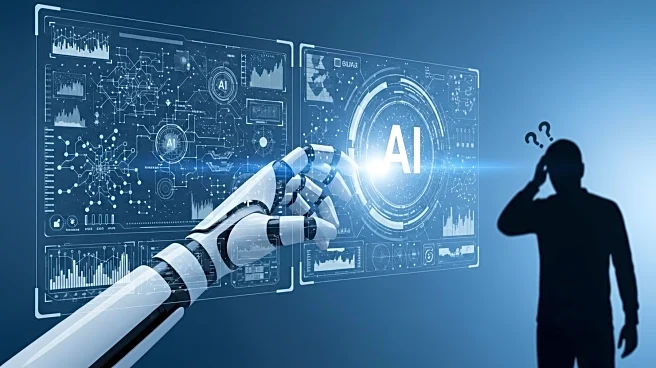What is the story about?
What's Happening?
A recent survey conducted by Indeed has revealed that a significant portion of Gen Z tech workers are feeling threatened by the rise of artificial intelligence (AI) in the workplace. The survey, which included over 1,000 tech workers, found that 35% are concerned about AI potentially taking over their roles, with this concern rising to 38% among Gen Z workers who are newer to the workforce. The report highlights that AI is reshaping job roles, with 37% of tech talent noting that positions at their current or most recent company have been redefined due to generative AI. Additionally, 52% reported reassignment of tech talent due to AI adoption, and 26% indicated layoffs as a result. The perception of AI is mixed, with 28% believing it will increase workplace stress and 33% feeling inadequately trained for the technology.
Why It's Important?
The integration of AI into the workforce is causing significant shifts in job security and career paths, particularly affecting Gen Z workers who are entering a rapidly changing job market. As AI continues to automate tasks traditionally performed by entry-level employees, the traditional career ladder is being disrupted. This has broader implications for the economy, as companies invest heavily in AI technology, potentially leading to job displacement in various sectors. The shift may drive Gen Z workers to pursue alternative career paths such as trades, entrepreneurship, or specialized technical roles that are less susceptible to AI automation. The concerns raised by Gen Z highlight the need for companies to provide adequate training and support to help workers adapt to these changes.
What's Next?
As AI continues to evolve, Gen Z workers may need to adapt by upskilling and rethinking job security. Companies might focus on maximizing efficiency and shareholder returns, further integrating AI into their operations. This could lead to a shift away from traditional corporate ladders, with more individuals pursuing careers in trades, entrepreneurship, or specialized technical fields. The ongoing changes in the job market may prompt educational institutions to reevaluate their curricula to better prepare students for a future where AI plays a significant role. Stakeholders, including businesses and policymakers, will need to address the challenges posed by AI to ensure a balanced and equitable workforce.
Beyond the Headlines
The rise of AI in the workplace raises ethical and cultural questions about the future of work and the role of technology in society. As AI automates more tasks, there is a risk of losing valuable skills and experiences that are traditionally gained through entry-level positions. This could impact the development of future leaders and innovators. Additionally, the reliance on AI may lead to increased workplace stress and a need for new strategies to manage employee well-being. The cultural shift towards AI-driven work environments may also influence societal values and expectations regarding career success and job satisfaction.


















